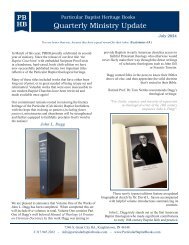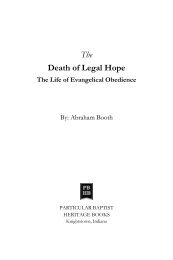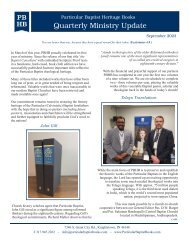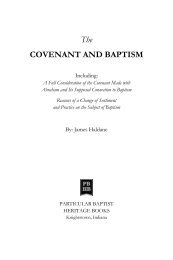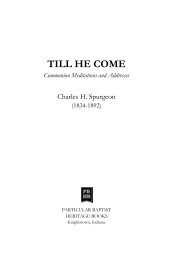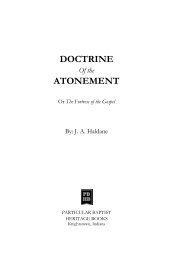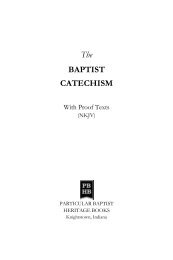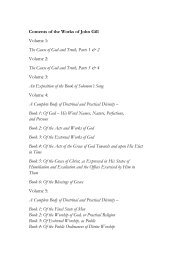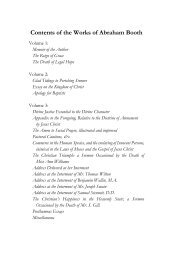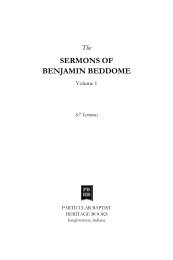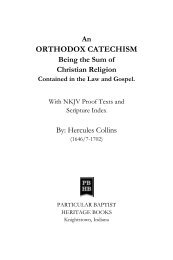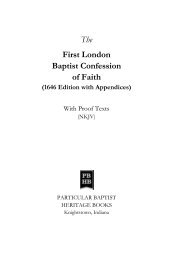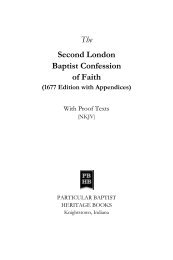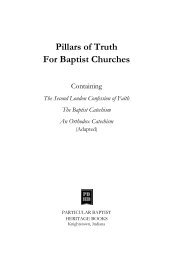the works of john gill vol2 SAMPLE
You also want an ePaper? Increase the reach of your titles
YUMPU automatically turns print PDFs into web optimized ePapers that Google loves.
Part 4: – A Vindication<br />
Adam,” which is what <strong>the</strong> passages were cited for. This writer, after<br />
Dr. Whitby, and which he has taken from him, cites a passage <strong>of</strong><br />
Hilary’s in which he says 56 , that “we do not endure <strong>the</strong> second death in<br />
hell for Adam’s sin, but only by occasion <strong>the</strong>re<strong>of</strong> it is exacted for our<br />
sins:” and I could direct him to ano<strong>the</strong>r in <strong>the</strong> same commentary 57 ,<br />
where he says, delicto Adœ multi tenentur a morte secunda in inferno<br />
inferiori; “many are held by <strong>the</strong> second death in <strong>the</strong> lowest hell for <strong>the</strong><br />
sin <strong>of</strong> Adam.”<br />
4. Ambrose is allowed to say some things <strong>of</strong> men’s deriving pollution<br />
and corruption from Adam, and it is owned that some passages in him<br />
do declare that he thought mankind defiled in Adam, and that <strong>the</strong>y are<br />
undone and destroyed in him: but Ambrose not only declares that a<br />
corrupt nature is derived from Adam, but also, that <strong>the</strong> fault <strong>of</strong> his<br />
transgression is transferred or imputed to his posterity, as appears from<br />
what I have cited from him.<br />
As to what Ambrose says concerning infants going to heaven, which<br />
he makes a doubt <strong>of</strong>, and being freed from punishment; it is to be<br />
hoped <strong>the</strong>y may, through <strong>the</strong> pardoning mercy <strong>of</strong> God, <strong>the</strong> blood <strong>of</strong><br />
Christ, and <strong>the</strong> regenerating grace <strong>of</strong> <strong>the</strong> Spirit, notwithstanding <strong>the</strong><br />
corruption <strong>of</strong> <strong>the</strong>ir nature, and <strong>the</strong> imputation <strong>of</strong> Adam’s sin to <strong>the</strong>m.<br />
5. Mark <strong>the</strong> Eremite is <strong>the</strong> last upon <strong>the</strong> list excepted to; who says,<br />
that “all men have been guilty <strong>of</strong> <strong>the</strong> sin <strong>of</strong> Adam’s transgression, and<br />
have <strong>the</strong>refore been condemned to death, so that without Christ <strong>the</strong>y<br />
cannot be saved.” Our author desires to know where <strong>the</strong> Latin word<br />
for guilty is to be found in this passage: Mark’s words are <strong>the</strong>se,<br />
cunctique peccato transgressionis fuerunt; which being literally<br />
rendered is, “all have been in <strong>the</strong> sin <strong>of</strong> his transgression;” and is not<br />
<strong>the</strong> sense <strong>the</strong> same?<br />
If <strong>the</strong>y were in it, <strong>the</strong>y must be guilty <strong>of</strong> it; for if not guilty, how<br />
should <strong>the</strong>y be condemned on account <strong>of</strong> it? for Mark adds, ideoque<br />
56 Comment on Romans 5. p. 209.<br />
57 Comment on Rom. 5. p. 272.<br />
43




